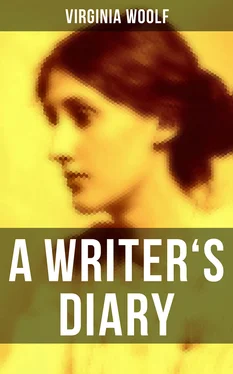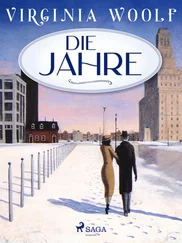Wednesday, March 19th.
Life piles up so fast that I have no time to write out the equally fast rising mound of reflections, which I always mark down as they rise to be inserted here. I meant to write about the Barnetts and the peculiar repulsiveness of those who dabble their fingers self approvingly in the stuff of others’ souls. The Barnetts were at any rate plunged to the elbow; red handed if ever philanthropists were, which makes them good examples; and then, unquestioning and unspeculative as they were, they give themselves away almost to the undoing of my critical faculty. Is it chiefly intellectual snobbery that makes me dislike them? Is it snobbery to feel outraged when she says ‘Then I came close to the Great Gates’—or reflects that God = good, devil = evil. Has this coarseness of grain any necessary connection with labour for one’s kind? And then the smug vigour of their self-satisfaction! Never a question as to the right of what they do—always a kind of insensate forging ahead until, naturally, their undertakings are all of colossal size and portentous prosperity. Moreover, could any woman of humour or insight quote such paeans to her own genius? Perhaps the root of it all lies in the adulation of the uneducated, and the easy mastery of the will over the poor. And more and more I come to loathe any dominion of one over another; any leadership, any imposition of the will. Finally, my literary taste is outraged by the smooth way in which the tale is made to unfold into fullblown success like some profuse peony. But I only scratch the surface of what I feel about these two stout volumes.
Thursday, March 27th.
… Night and Day which L. has spent the past two mornings and evenings in reading. I own that his verdict, finally pronounced this morning, gives me immense pleasure: how far one should discount it, I don’t know. In my own opinion N. & D. is a much more mature and finished and satisfactory book than The Voyage Out; as it has reason to be. I suppose I lay myself open to the charge of niggling with emotions that don’t really matter. I certainly don’t anticipate even two editions. And yet I can’t help thinking that, English fiction being what it is, I compare for originality and sincerity rather well with most of the moderns. L. finds the philosophy very melancholy. It too much agrees with what he was saying yesterday. Yet, if one is to deal with people on a large scale and say what one thinks, how can one avoid melancholy? I don’t admit to being hopeless though: only the spectacle is a profoundly strange one; and as the current answers don’t do, one has to grope for a new one, and the process of discarding the old, when one is by no means certain what to put in their place, is a sad one. Still, if you think of it, what answers do Arnold Bennett or Thackeray, for instance, suggest? Happy ones—satisfactory solutions—answers one would accept, if one had the least respect for one’s soul? Now I have done my last odious piece of typewriting, and when I have scribbled this page, I shall write and suggest Monday as the day for coming up to lunch with Gerald. I don’t suppose I’ve ever enjoyed any writing so much as I did the last half of Night and Day. Indeed, no part of it taxed me as The Voyage Out did; and if one’s own ease and interest promise anything good, I should have hopes that some people, at least, will find it a pleasure. I wonder if I shall ever be able to read it again? Is the time coming when I can endure to read my own writing in print without blushing—shivering and wishing to take cover?
Wednesday, April 2nd.
Yesterday I took Night and Day up to Gerald and had a little half domestic half professional interview with him in his office. I don’t like the Clubman’s view of literature. For one thing it breeds in me a violent desire to boast: I boasted of Nessa and Clive and Leonard; and how much money they made. Then we undid the parcel and he liked the title but found that Miss Maud Annesley has a book called Nights and Days —which may make difficulties with Mudies. But he was certain he would wish to publish it; and we were altogether cordial; and I noticed how his hair is every blade of it white, with some space between the blades; a very sparsely sown field. I had tea at Gordon Square.
Saturday, April 12th.
These ten minutes are stolen from Moll Flanders, which I failed to finish yesterday in accordance with my time sheet, yielding to a desire to stop reading and go up to London. But I saw London, in particular the view of white city churches and palaces from Hungerford Bridge through the eyes of Defoe. I saw the old women selling matches through his eyes; and the draggled girl skirting round the pavement of St James’s Square seemed to me out of Roxana or Moll Flanders. Yes, a great writer surely to be there imposing himself on me after 200 years. A great writer—and Forster has never read his books! I was beckoned by Forster from the Library as I approached. We shook hands very cordially; and yet I always feel him shrinking sensitively from me, as a woman, a clever woman, an up to date woman. Feeling this I commanded him to read Defoe, and left him, and went and got some more Defoe, having bought one volume at Bickers on the way.
Thursday, April 17th.
However one may abuse the Stracheys their minds remain a source of joy to the end; so sparkling, definite and nimble. Need I add that I reserve the qualities I most admire for people who are not Stracheys? It is so long since I have seen Lytton that I take my impression of him too much from his writing, and his paper upon Lady Hester Stanhope was not one of his best. I could fill this page with gossip about people’s articles in the Athenaeum ; since I had tea with Katherine yesterday and Murry sat there mud-coloured and mute, livening only when we talked his shop. He has the jealous partiality of a parent for his offspring already. I tried to be honest, as if honesty were part of my philosophy, and said how I disliked Grantorto on whistling birds, and Lytton and so on. The male atmosphere is disconcerting to me. Do they distrust one? despise one? and if so why do they sit on the whole length of one’s visit? The truth is that when Murry says the orthodox masculine thing about Eliot, for example, belittling my solicitude to know what he said of me, I don’t knuckle under; I think what an abrupt precipice cleaves asunder the male intelligence, and how they pride themselves upon a point of view which much resembles stupidity. I find it much easier to talk to Katherine; she gives and resists as I expect her to; we cover more ground in much less time; but I respect Murry. I wish for his good opinion. Heinemann has rejected K.M.’s stories; and she was oddly hurt that Roger had not invited her to his party. Her hard composure is much on the surface.
Easter Sunday, April 20th.
In the idleness which succeeds any long article, and Defoe is the second leader this month, I got out this diary and read, as one always does read one’s own writing, with a kind of guilty intensity. I confess that the rough and random style of it, often so ungrammatical, and crying for a word altered, afflicted me somewhat. I am trying to tell whichever self it is that reads this hereafter that I can write very much better; and take no time over this; and forbid her to let the eye of man behold it. And now I may add my little compliment to the effect that it has a slapdash and vigour and sometimes hits an unexpected bull’s-eye. But what is more to the point is my belief that the habit of writing thus for my own eye only is good practice. It loosens the ligaments. Never mind the misses and the stumbles. Going at such a pace as I do I must make the most direct and instant shots at my object, and thus have to lay hands on words, choose them and shoot them with no more pause than is needed to put my pen in the ink. I believe that during the past year I can trace some increase of ease in my professional writing which I attribute to my casual half hours after tea. Moreover there looms ahead of me the shadow of some kind of form which a diary might attain to. I might in the course of time learn what it is that one can make of this loose, drifting material of life; finding another use for it than the use I put it to, so much more consciously and scrupulously, in fiction. What sort of diary should I like mine to be? Something loose knit and yet not slovenly, so elastic that it will embrace any thing, solemn, slight or beautiful that comes into my mind. I should like it to resemble some deep old desk, or capacious hold-all, in which one flings a mass of odds and ends without looking them through. I should like to come back, after a year or two, and find that the collection had sorted itself and refined itself and coalesced, as such deposits so mysteriously do, into a mould, transparent enough to reflect the light of our life, and yet steady, tranquil compounds with the aloofness of a work of art. The main requisite, I think on re-reading my old volumes, is not to play the part of censor, but to write as the mood comes or of anything whatever; since I was curious to find how I went for things put in haphazard, and found the significance to lie where I never saw it at the time. But looseness quickly becomes slovenly. A little effort is needed to face a character or an incident which needs to be recorded. Nor can one let the pen write without guidance; for fear of becoming slack and untidy like Vernon Lee. Her ligaments are too loose for my taste.
Читать дальше











